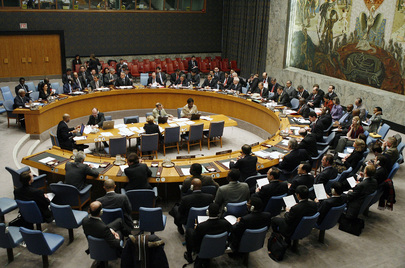UN Security Council calls on South Sudanese parties to resolve 28 states
June 1, 2016 (NEW YORK) – United Nations Security Council (UNSC) has called on warring parties, turned peace partners, “to fully and unconditionally implement all parts of the Agreement”, uphold the permanent ceasefire and address the economic crisis and dire humanitarian situation in the country.

“Welcoming the resolve indicated in the IGAD Council of Ministers Communique of 31 January 2016, urging the TGNU to abide by and take no action inconsistent with the Intergovernmental Authority on Development (IGAD) 30-31 January 2016 communique, which was subsequently endorsed by the parties and JMEC, on the issue of the Presidential Decree on the creation of 28 new states and calling on the United Nations Security Council to support consequences in the event the South Sudanese parties fail or refuse to implement the Peace Agreement…,” partly reads the resolution of the UN Security Council.
It also demanded that the parties to the conflict take immediate action to ensure unconditional humanitarian access across the country.
It further recalled the communique of the 28th Extraordinary Session of the IGAD Assembly of Heads of State and Government, which inter alia, invited collective action as appropriate by the States of IGAD to enact asset freezes and travel bans, and deny the supply of arms and ammunition and any other material that could be used in war.
“Reiterating its concern at persistent restrictions placed upon the movement and operations of UNMISS, strongly condemning the attacks by government and opposition forces and other groups on United Nations and IGAD personnel and facilities, and the detentions and kidnappings of United Nations and associated personnel and calling upon the Government of South Sudan to complete its investigations of these attacks in a swift and thorough manner and to hold those responsible to account,” it reads.
The Council stressed that the “situation in South Sudan continues to constitute a threat to international peace and security in the region.”
It expressed deep concern at the failures of South Sudan’s leaders to fully implement their commitments pursuant to the Agreement, and to bring an end to the hostilities. It further condemned the continued and flagrant violations of the ceasefire provisions of the Agreement, including violations as documented by the Ceasefire and Transitional Security Arrangements Mechanism.
It called on the South Sudan’s leaders to fully and immediately adhere to the permanent ceasefire in accordance with their obligations under the Agreement, and allow in accordance with relevant provisions of international law and the UN guiding principles of humanitarian assistance, full, safe and unhindered humanitarian access to help ensure timely delivery of humanitarian assistance to all those in need.
The Council underscored its willingness to impose targeted sanctions on South Sudanese leaders who continue to violate the agreement in order to support the search for an inclusive and sustainable peace in South Sudan.
It decries policies or actions that threaten transitional agreements or undermine the political process in South Sudan, including planning, directing, or committing acts that violate applicable international human rights law or international humanitarian law, or acts that constitute human rights abuses in South Sudan.
The Council further decried targeting of civilians, including women and children, through the commission of acts of violence, including killing, maiming, torture, or rape or other sexual and gender-based violence, or abduction, enforced disappearance, forced displacement, or attacks on schools, hospitals, religious sites, or locations where civilians are seeking refuge.
“The obstruction of the activities of international peacekeeping, diplomatic, or humanitarian missions in South Sudan, including the Ceasefire and Transitional Security Arrangements Monitoring Mechanism or of the delivery or distribution of, or access to, humanitarian assistance,” it pointed out as among the violations.
It also accuses parties of attacks against United Nations missions, international security presences, or other peacekeeping operations, or humanitarian personnel.
“Expresses its intent to monitor and review the situation at 90 day intervals fi’om the adoption of this resolution or more frequently, as needed, and invites the JMEC to share relevant information with the Council, as appropriate, on its assessment of the parties’ implementation of the Agreement, adherence to the permanent ceasefire, and facilitation of humanitarian access, also expresses its intent to impose any sanctions that may be appropriate to respond to the situation, which may include an arms embargo and the designation of senior individuals responsible for actions or policies that threaten the peace, security or stability of South Sudan, including by impeding tile implementation of the Agreement, or by failing to take effective and comprehensive steps to cause forces under direct or indirect control to cease military operations, acts of violence, as well as human rights violations or abuses or violations of international humanitarian law, and to enable full access for humanitarian assistance,” it said.
Although the world body renewed sanctions on South Sudan for one more year, it also said it shall be prepared to adjust the measures contained in the resolution, including by strengthening through additional measures, as well as modification, suspension or lifting of the measures, as may be needed at any time in light of the progress achieved in the peace, accountability, and reconciliation process.
The resolution said further actions will depend on the implementation of the August 2015 peace agreement and the parties’ commitments, including the ceasefire, and compliance with the UN resolutions.
(ST)
